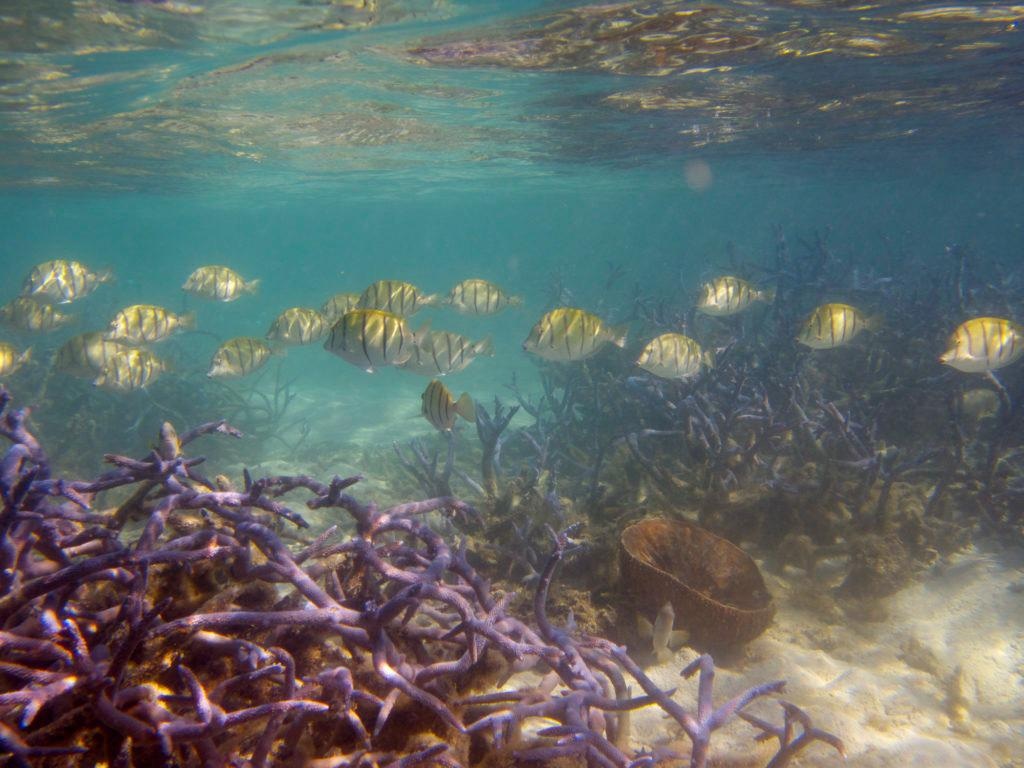Reviewed by Alex SmithSep 20 2021
According to recent research led by the University of British Columbia, the capacity of coral reefs to offer ecosystem services, which are depended upon by millions of people around the world, has dropped by half since the 1950s.

Image Credit: Dr. Tyler Eddy
The study provides the first complete look at what overfishing, climate change and habitat destruction of coral reefs mean for their ecosystem services, or the capacity of the reef to deliver vital services and benefits to humans, including livelihoods, food and defense against storms.
In total, the findings revealed that the substantial loss in coral reef coverage has resulted in an equally substantial loss in the capacity of the reef to offer these services.
Other findings are likewise not positive: the researchers discovered that global coverage of living corals had dropped by approximately half since the 1950s, and therefore, the diversity of species had also dropped, by over 60%.
It’s a call to action — we’ve been hearing this time and time again from fisheries and biodiversity research.
Dr. Tyler Eddy, Study Lead Author and Research Scientist, Fisheries & Marine Institute, Memorial University of Newfoundland
Dr. Tyler Eddy was a research associate at UBS’s Institute for the Oceans and Fisheries during the research. He is presently a research scientist at the Fisheries & Marine Institute at the Memorial University of Newfoundland.
Dr. Eddy said the continuing deterioration of healthy coral reefs and the quality of habitat they provide is adding to a worldwide decline in the provision of ecosystem services for the millions of people who depend on them.
“We know coral reefs are biodiversity hotspots. And preserving biodiversity not only protects nature, but supports the humans that use these species for cultural, subsistence and livelihood means.”
The scientists examined trends for coral reef systems and related ecosystems across the globe, merging datasets from coral reef surveys, estimating coral reef-related biodiversity, fisheries catches and effort, fisheries impacts on food web structure and indigenous consumption of coral reef-related fish.
They also examined universal and country-level patterns in ecosystem services and how they matched with patterns for small island developing states.
In addition to decreases in reef coverage and biodiversity, the scientists found catches of fish on coral reefs increased in 2002 and have progressively decreased ever since, regardless of an increase in fishing effort. The catch per unit effort, habitually used as a clue of variations in biomass, is currently 60% lower than it was in 1950.
This study speaks to the importance of how we manage coral reefs not only at regional scales, but also at the global scale, and the livelihoods of communities that rely on them.
Dr. William Cheung, Study’s Senior Author and Professor and Director, Institute for the Oceans and Fisheries, The University of British Columbia
The findings made the scientists determine that persistent degradation of the reef would soon hamper the well-being and sustainable development of coastal communities that depend on the coral reef.
Fish and fisheries offer vital micronutrients in coastal developing regions with few substitute sources of nutrition, Dr. Eddy said. Furthermore, coral reef biodiversity and fisheries bear additional importance for coastal and indigenous communities where crucial cultural relationships with reefs exist with consumption of seafood by coastal indigenous communities being 15 times higher than non-indigenous communities.
The study pinpoints that coastal and indigenous communities — in this case in the tropics — are being unfairly harmed due to the world’s activities, said co-author Dr. Andrés Cisneros-Montemayor, an IOF research associate during the study period, and currently an assistant professor at Simon Fraser University.
It’s heart-wrenching for us to see photos and video of wildfires or floods, and that level of destruction is happening right now all over the world’s coral reefs and threatening people’s culture, their daily food, and their history. This isn’t just an environmental issue, it’s also about human rights.
Dr. William Cheung, Study’s Senior Author and Professor and Director, Institute for the Oceans and Fisheries, The University of British Columbia
“Finding targets for recovery and climate adaptation would require a global effort, while also addressing needs at a local level. Climate mitigation actions, such as those highlighted in the Paris Agreement, the Intergovernmental Science-Policy Platform on Biodiversity and Ecosystem Services, and the Intergovernmental Panel on Climate Change, all call for integrated action to address biodiversity, climate, and social challenges. We are not there yet,” he added.
The study has been reported in One Earth.
Journal Reference:
Eddy, T. D., et al. (2021) Global decline in capacity of coral reefs to provide ecosystem services. One Earth. doi.org/10.1016/j.oneear.2021.08.016.